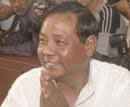
New Delhi, May 18: A day after the AIADMK and BJD announced support for party leader P A Sangma's candidature, NCP chief Sharad Pawar today said his party's stand on the Presidential election will be consistent with that of the UPA.
Sangma, who met Pawar this morning, said the NCP leader told him that the party is part of UPA and his stand on the issue will be consistent with it.
At the same time, Pawar, who is also the Union Agriculture Minister, said they would discuss all suggestions given by Sangma.
On his part, Sangma explained to him that he was part of a forum which was pushing for a tribal leader to become the next President.
The former Lok Sabha Speaker said he along with a few other leaders was meeting leaders of various political parties to push for a tribal to become the next president.
Besides him, there were several other tribal leaders including Karia Munda (BJP), who is Lok Sabha Deputy Speaker, Union Minister Krishna Chandra Deo (Congress), former Nagaland Chief Minister S C Jamir (Congress) and former union minister Arvind Neta.
"Any tribal leader can become the next president that is what we are trying to achieve, he said.
Asked if he was pulled up by Pawar on the issue as reported in a section of the media, Sangma said, "Nothing of that sort happened".
The NCP had yesterday virtually disowned attempts by Sangma to enter the Presidential race
"I am not aware of any such development. Sangma has not spoken to us. We have had no discussions. We feel that with such a limited strength, we cannot aspire for such a major post," Pawar had said.
Odisha Chief Minister and BJD supremo Naveen Patnaik had yesterday backed Sangma for the post of President of India.
AIADMK supremo and Tamil Nadu Chief Minister Jayalalithaa had said her party will support Sangma for President's post.
Pawar's party is a key ally of the Congress-led UPA at the Centre since May 2004 and the two parties are also sharing power in Maharashtra since 2009. He had sometime back met Congress President Sonia Gandhi who has been holding consultations with UPA constituents and allies over the Presidential election.






Comments
Add new comment